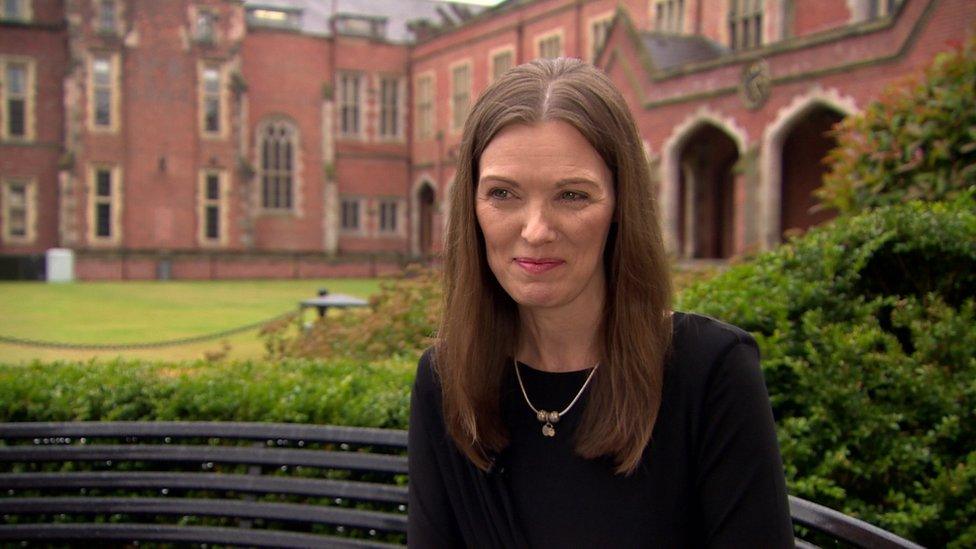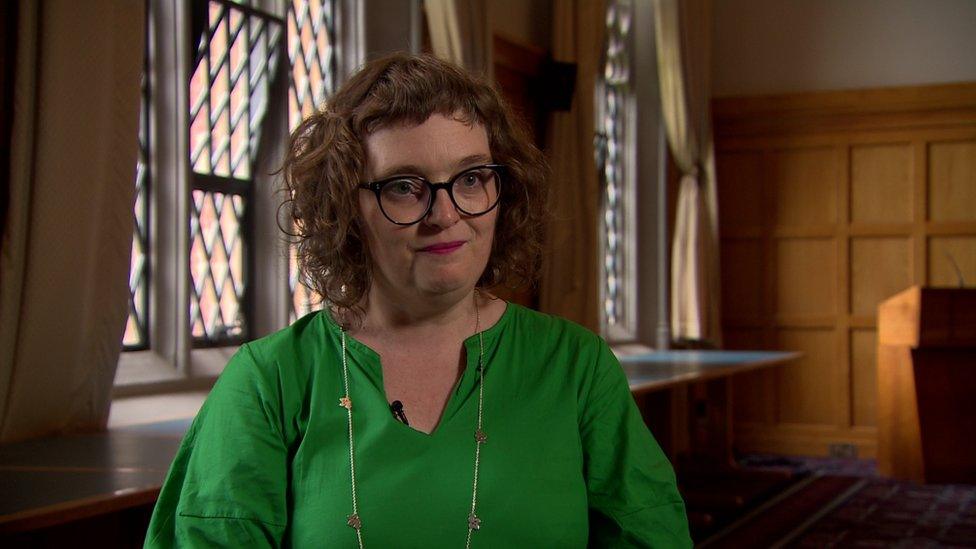Queen's University supports staff with menopausal symptoms
- Published

Staff at Queen's University Belfast who are undergoing fertility treatment or experiencing menopausal symptoms are to be supported with the introduction of two new health policies.
Women and their partners are to be offered up to five days additional paid leave per fertility treatment cycle.
Partners are to gain two days of additional paid leave.
The menopause policy aims to provide training and awareness for all staff.
It will support those women who are coping with symptoms such as insomnia and sweats.
Meanwhile, Health Minister Robin Swann has said Northern Ireland is "not as advanced" as some of the other devolved administrations or England on menopause.
Mr Swann, who sits on the UK Menopause Taskforce since it started last February, told BBC News NI "much more can be done to help women".

Prof Karen McCloskey, director of Queen's University's Gender Initiative, said the menopause policy will ensure everyone is treated fairly in the workplace
Addressing the menopause through a work policy is increasingly common.
More employers are recognising that coping with either fertility treatment or menopause symptoms can be difficult while also juggling work.
Prof Karen McCloskey, director of Queen's University's Gender Initiative, said the menopause policy would ensure everyone was treated fairly in the workplace.
"We want people to feel confident that they can discuss their individual circumstances and receive practical support," she said.
The university has been running a series of menopause awareness sessions and Prof McCloskey said that through feedback it realised it needed to do more.
More than half of the university's workforce are women.
Of its 4,330 staff, nearly 2,370 are female with 45% of them over 45 years old - the age typically affected by menopause.
Most women go through the menopause between the ages of 45 and 55, with symptoms lasting about four years on average, although one in 10 can experience them for up to 12 years.
While many employers are introducing menopause work policies, addressing fertility as an issue is new.

Dr Jenny Johnston said introducing a fertility policy only strengthens women's health issues and equality in the work place
The university said it was an "important recognition of the effect of the process on individuals, and the need for a little space to, for example, attend appointments, receive treatment and facilitate recovery".
Dr Jenny Johnston, a GP and a reader in medical education, has been involved in the university's awareness sessions and said introducing a fertility policy would strengthen women's health issues and equality in the workplace.
"Fertility treatment involves a lot of scans, appointments, injections and it can be very difficult on a couple," she added.
"It is a huge burden that people carry not just for the women who have the more invasive procedures, but also for the men who are also going through a difficult time."
Anne McGale, from Menopause Wellbeing NI, says women want equal treatment
Anne McGale, who has been through fertility treatment and experienced menopause, said workplace policies were about equality.
"I don't think women want any more than any other person in the workplace," she said.
"Having these policies allows women to do their work to the best of their ability without that extra added bit of stress.
"We are used to working with different things going on in our lives and every month women have their period and they're used to working through with that."
Ms McGale said these matters were rarely discussed with employers in the past but "women's health has been taken more into the open".
The UK taskforce has representatives from Northern Ireland, England, Scotland and Wales, and aims to learn from each other's experience.
Mr Swann said any outcomes would be "given due consideration by officials" to help to inform direction for Northern Ireland, as appropriate.
"It's hoped that cross-departmental work supported by the Department of Health can be taken forward, subject to agreement from the Northern Ireland Executive when it is re-established," Mr Swann said.
- Published28 July 2022

- Published7 January 2020

- Published12 September 2018
